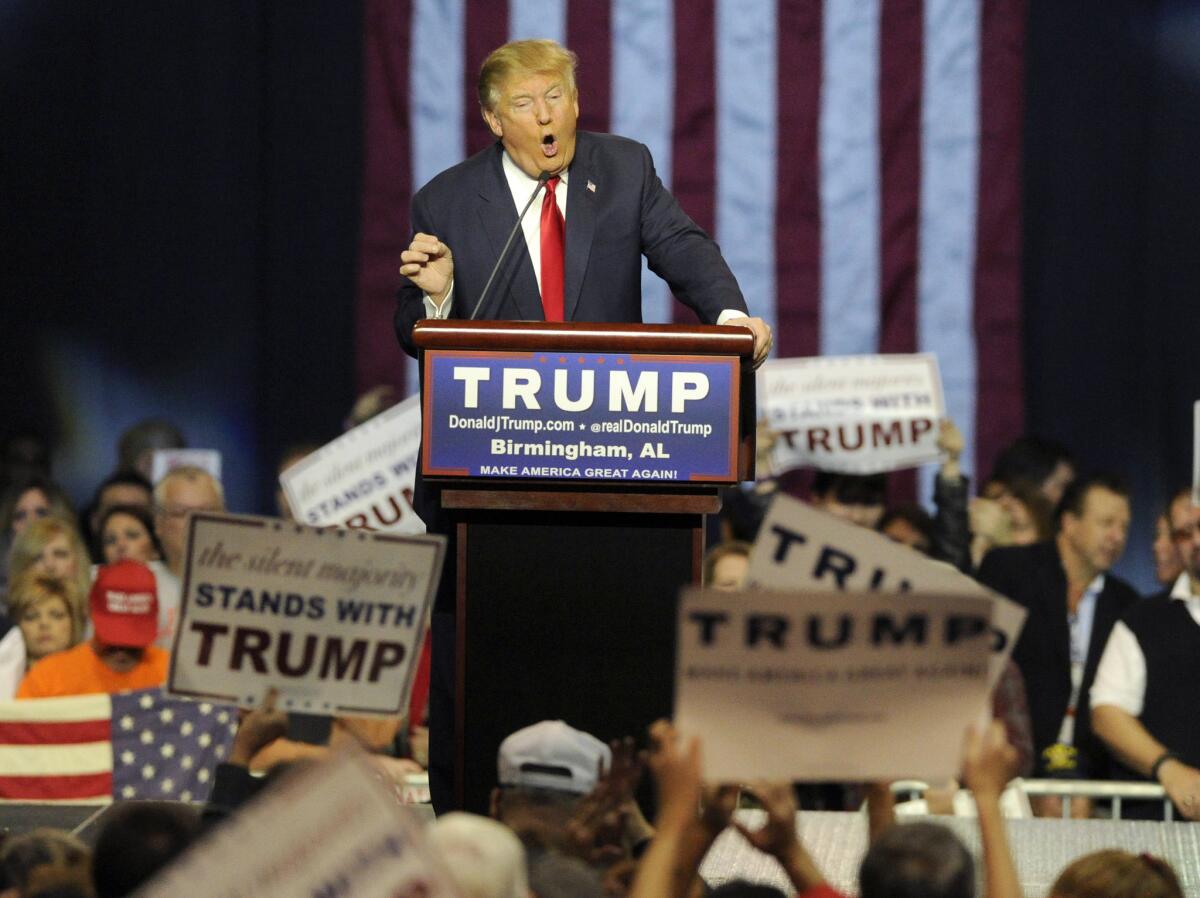Column: What fuels Trump’s rise? Anger and fear

Republican presidential candidate Donald Trump speaks during a campaign stop in Birmingham, Ala. on Saturday, Nov. 21.
- Share via
Donald Trump is still on top of the polls — defiantly, loudly, implausibly on top, even after saying things that would doom any candidate in a normal year.
A month ago, Trump’s standing among Republican presidential candidates appeared to be eroding, especially in Iowa, where Ben Carson was gaining support. But since the Nov. 13 terrorist attacks in Paris, Trump has seized the center of the GOP’s stage and bolstered his lead in both national and state polls. The horrors inflicted by Islamic State have given his campaign a lift.
How can a figure this gratuitously divisive hold on to his place atop the GOP presidential standings? Anger and fear.
The would-be president said he would register Muslims in a national database and probably close some of their mosques. He charged that Muslims in Jersey City, N.J., cheered the collapse of the World Trade Center in 2001, even though there’s no evidence of such a thing. He warned that President Obama plans to admit 250,000 Syrian refugees next year; the real number is 10,000. He sent out bogus statistics claiming that 81% of white murder victims are killed by black people; after Bill O’Reilly of Fox News told him that wasn’t true, Trump shrugged and said he didn’t have time to check the facts. And that’s only in the last week.
How can a figure this gratuitously divisive hold on to his place atop the Republican presidential standings? Anger and fear.
The anger of conservative voters has been evident all year, but this week the nonpartisan Pew Research Center released an important study that added new detail to the picture. The headline on Pew’s report was that only 19% of Americans say they can trust the federal government most of the time, one of the lowest levels in half a century. But among Republicans, that disaffection runs much deeper: 32% say they not only mistrust the government but are “angry” with it.
The angriest voters, Pew found, are politically engaged conservatives, the Republicans most likely to vote in primary elections. Most of them say an ordinary citizen could do a better job in the White House than a professional politician. Among that group, Citizen Trump scores high.
“We’re sick of career politicians,” Marenda Babcock, 60, a Trump supporter in Indiana, said at a focus group sponsored by the University of Pennsylvania’s Annenberg Center last month. “We did what we were supposed to do. We wrote the letters, we made the phone calls, and they did not listen. And we’re out to clean house.”
Now add another inflammatory element to the mix: fear. After the Paris attacks, polls showed that terrorism had jumped to first place among voters’ concerns, displacing even the economy and jobs.
Trump was quick to take advantage. Not only did he reject Obama’s proposal to admit more Syrian refugees; he called for deporting any refugees who have already arrived.
Other candidates tried to match him — Ted Cruz said he’d admit only Christians, Chris Christie said he’d deny entry to children — but nobody does truculence as convincingly as Trump. Carson, who delivers his conservatism in more soothing tones, sounded uncertain, and lost some of his support.
An ABC-Washington Post poll released this week found that 42% of Republicans named Trump as the candidate they trusted most to handle terrorism, far ahead of any of his competitors.
The public’s heightened fear may not last until next year’s general election, but it will surely remain fresh until the Iowa caucuses in January.
Even so, Trump is the preferred candidate of only about one-third of Republican voters. By all rights, something should happen to unseat him. But what?
I consulted several strategists for Trump’s competitors — and came up empty.
“I wish I knew,” said the advisor for one candidate, who begged for anonymity to prevent his haplessness from becoming public knowledge.
If only the party could unite around a single alternative to Trump, he said, but “that’s not happening yet.” Maybe the voters will wise up, he ventured. “When it’s time to cast a real ballot, they’re going to think about electability, about which candidate can win the general election against Hillary Clinton.”
“Watch the next debate,” another strategist advised. “Someone will recognize the need to go after him.”
Or maybe Trump will come in second in Iowa, he continued, and decide to withdraw, because he doesn’t want to look like a loser. “He lives by the polls and will die by the polls,” he said. “Watch him get angry when the Iowa polling shows him drop.”
Or maybe none of that will happen. “Some of these scenarios are really just magical thinking,” the first advisor said. “He has and continues to defy political gravity.”
Trump is still a long way from becoming his party’s presidential nominee, but by all logic, he shouldn’t even be this close. This campaign, however, hasn’t been governed by logic; it’s been governed by anger and fear.
Twitter: @doylemcmanus
Follow the Opinion section on Twitter @latimesopinion and Facebook
More to Read
A cure for the common opinion
Get thought-provoking perspectives with our weekly newsletter.
You may occasionally receive promotional content from the Los Angeles Times.











